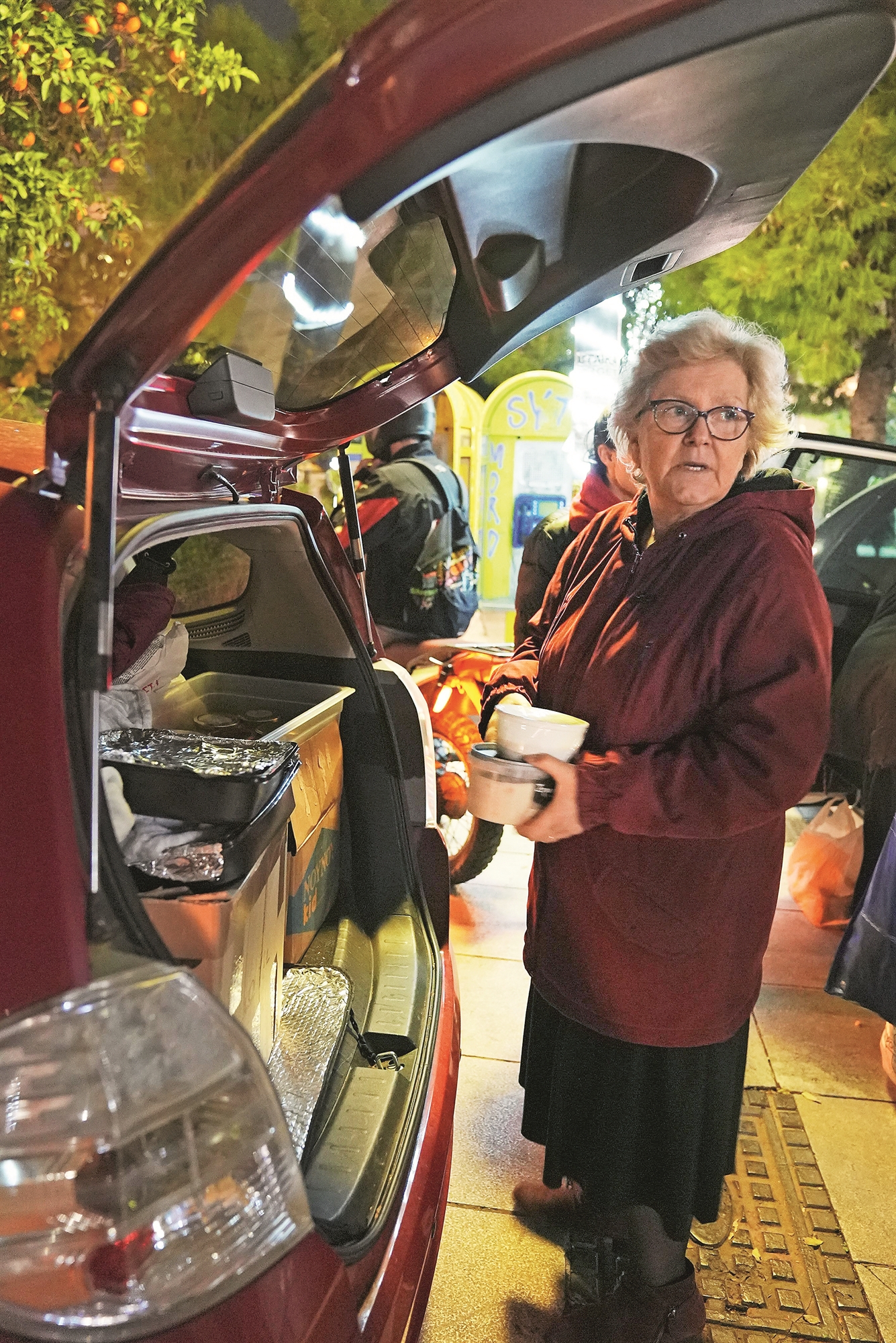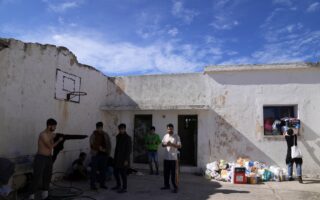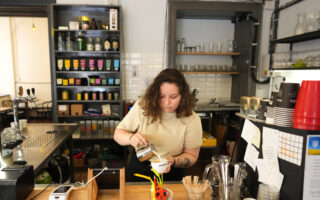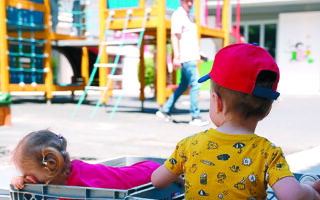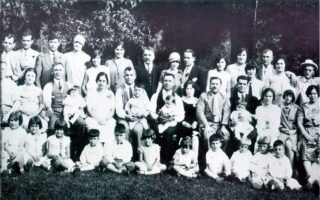Thousands of refugees back out in the cold
Kathimerini looks at the impact of the expiry of the ESTIA housing program on vulnerable asylum seekers and at efforts to help them
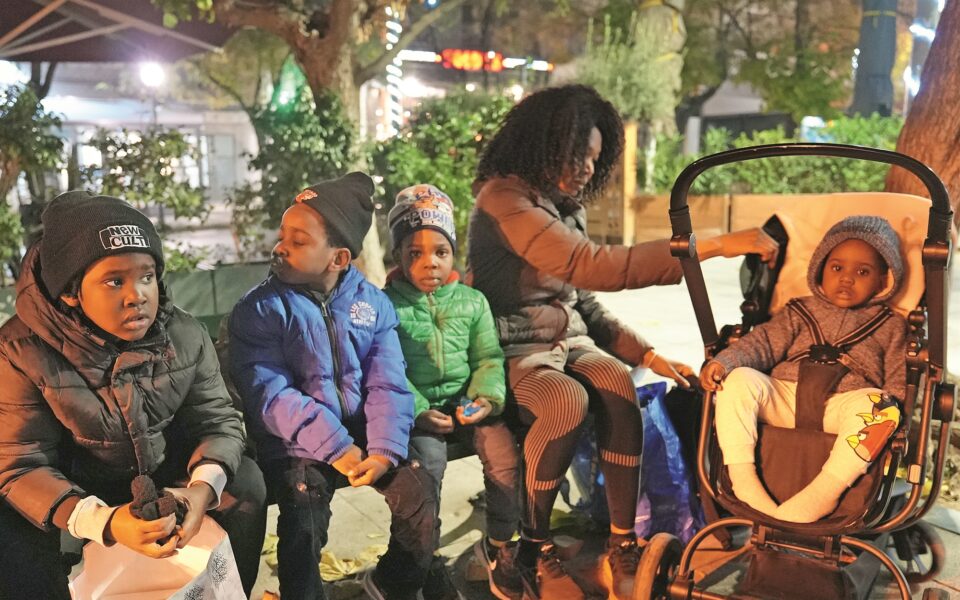
It wasn’t too cold the first night Marie spent on the streets of downtown Athens even though it was already early December. She had a small school bag with some milk, biscuits, diapers and baby wipes. She had been planning to spend the night in the courtyard of Agios Panteleimonas Church, but felt that she would be safer in Victoria Square, where there were police officers, so she went there. She covered her son with a cotton sheet and tried to lull him to sleep.
When he finally nodded off she started crying. Marco had not yet turned 2 years old, and while he likely understood very little of what was going on, Marie tried her best not to show him her despair. She did not manage to sleep. Every time she was about to drowse off she would snap awake. When dawn finally broke she tried to find some food, charged her phone and called every person she knew in an effort to find out if there was a place to stay or work. But the next night found her back in the same place.
Marie arrived in Greece from Congo in 2018 and spent the first two years at the refugee camp on the eastern Aegean island of Samos. There, as she told Kathimerini, her husband got very ill and died, and she was moved to Athens while pregnant. She found shelter at a facility in the city center that was operating as part of the ESTIA program, which arranged accommodation for asylum seekers, and it was while she was staying there that she gave birth.
Sometime in early summer, it was announced that all the shelters would close as the program was set to end at the end of 2022 and that the roughly 10,000 asylum seekers then staying in them would gradually be moved to camps all around Greece. Marie was granted asylum and while she could informally stay at the shelter until she was able to stand on her own two feet, it was no longer an option. She had to leave. She did not lose hope, however, and quickly found a job as a maid at a hotel near Omonia Square, which enabled her to rent a small studio apartment. But the job ended after the summer. She had saved some money, but by November she was flat broke. So, one day in December she found herself on the street with her baby.
At that time Christos Nakis, a founding member of the Plision group that for 17 years has been on the streets helping anyone in need, received a phone call from Dr Maria Dasiou. “She told me that there were homeless people living around Agios Panteleimon, three mothers with babies.” Nakis went to the area and was surprised to see that there were no longer just three. A volunteer team was immediately activated. Nakis and his wife Ada Fengou cooked 50 portions of pasta with minced meat at home, Asteroula Thermou provided milk powder and croissants and baked two large cakes, and Pavlos Korovesis tried to find clothes. At 8.30 p.m. Anastasia Korovesi, who speaks French, texted a number she had been given that “they had arrived in Victoria Square.” At the time, Marie and Marco were there on a bench and another mother with four older boys on another. A short time later 10 more mothers appeared with their babies. They told the team they were homeless and that they were sleeping around there – in the churchyard or in the entrances of apartment buildings. It was freezing, but some were completely inappropriately dressed, in flipflops and with no jackets.
Some had received a negative decision on their asylum application, so the camps did not accept them. But some who were still awaiting their asylum decision and whose only option was to go to the camps had been refused a transfer and ended up homeless. It’s not just that the camps were far away with no prospect of integration, but that they were afraid, the mothers told Kathimerini, trying to explain why they preferred to be on the street rather than at a camp: “It’s worse than a prison. We may have hot water and electricity but we’re not safe. Dangerous networks are in charge.”
The Plision team managed to find temporary shelter for two of the most vulnerable women that first night – Marie and little Marco were taken in by OKANA, an organization that looks out for drug addicts, and Tadine, six months pregnant, and 2-year-old Elena were taken to the Pergamos Hotel on Acharnon Street. The volunteers had collected some money and gave it to Mr Nikos at the reception desk. When he heard her story, he gave them a better price. Later they learned that he had decided to cover the difference himself.
The next day, Anastasia Korovesi accompanied Tadine to the Doctors of the World polyclinic. The doctor asked her where she was staying and Korovesi explained that they had secured a hotel room for two more days. On leaving, a lady who had overheard the conversation discreetly gave her 20 euros. “I don’t have more, but I hope you can pay for the hotel for one more day,” she told her. In the meantime, the group of volunteers spoke with the Municipality of Athens, the Archdiocese’s philanthropic fund and several organizations they had worked with in the past. Some helped with essentials, but no solution for housing was found. Some found temporary shelter with people they knew, but other women with babies remained on the street. On Christmas Eve, the Plision team arrived with two cars full of goodies – cooked food, clothes, warm blankets and a gift for each child.
On Christmas Eve, the Plision team arrived with two cars full of goodies – cooked food, clothes, warm blankets and a gift for each child
Manos Logothetis, general secretary for the reception of asylum seekers, confirmed to Kathimerini that on Christmas Day they received information about the homeless women from the Municipality of Athens, but the police team did not locate them. He pledged that they would try again, and this time they did. Plans were made to transfer those still on the street to shelters – even the recognized refugees who do not formally come under his jurisdiction – until, he said, a long-term solution is found. “We know there will be opposition to the ending of the ESTIA program, but we are ready to deal with it,” he told Kathimerini.
An odyssey
The ESTIA program was launched in 2015 by the UN Refugee Agency with a budget of €40 million and 25,000 places in decent shelters in cities with the prospect of integration. Along the way, it was integrated into the actions of the Ministry of Migration and Asylum with the financial support of the European Union, and when the decision was taken to end it, the number of beneficiaries stood at less than 10,000. When asked why it did not continue the program with fewer shelters, the ministry responded that for reasons of transparency they could not make a distinction between who was entitled to stay at the shelters and who at the camps, while stressing that it considered the criticism of the camps to be insubstantial. It also announced that temporary accommodation at shelters for 1,000 vulnerable individuals – pregnant women, cancer patients and so on – would start operating from February. In a press conference given by Minister Notis Mitarakis, he was clear about the reasons why asylum seekers should return to the camps. The aim, he said, was to reduce costs and decongest the center of Athens.
Forced transfer
The Home Project, an organization that provides shelter and support to unaccompanied refugee children, has been following developments regarding the ESTIA project with concern. Not because any of their shelters were part of the program, but because they knew that such decisions would affect some of their youngsters, who would move to adult shelters after reaching adulthood. Their fears were realized when Ruth, one of their girls, turned 18.
Ruth had arrived at the shelter six months earlier in a very sickly condition. She had just given birth and was living with her newborn, homeless, in Pedion tou Areos park. One day, unable to find food, she stole something for the baby from a minimarket. The shopkeeper had seen her on camera and was waiting for her at the entrance to ask for the money. But as soon as she saw what the young woman had stolen, she realized she was homeless and called the authorities. Not to report her, but to help. The special mechanism for locating homeless minors was immediately activated and Ruth was taken to a Home Project shelter. There, they put together a psycho-educational plan and for the first few weeks they focused on taking care of her and the baby, before teaching her how to take care of the little one by herself. Slowly she began to open up. She told them about what she had experienced in the war zone in Congo, how in Turkey she had been sexually exploited, how she managed to escape from the slave traders when she realized she was pregnant and make it to Greece, where she gave birth prematurely.
With the support of the shelter, her progress was spectacular. She started Greek and English lessons, she couldn’t wait to start school, she chose a name for her baby. She named him Vincenzo, after the star of her favorite Netflix series – a young boy, smart and resourceful, just as she hopes her son will turn out when he grows up. On November 25, Ruth turned 18. She painted her nails so it looked like they had rhinestones and tiny snowflakes on them, and in the afternoon they threw her a little party with cake and music.
Sofia Kouvelaki, CEO of The Home Project, knew of course that the countdown for her move had begun and had already contacted the ministry. She explained to them Ruth’s burdened background and the progress she had already made. “It is virtually impossible for her to live at a camp. Both she and the baby would be at risk,” Kouvelaki told them, asking to be allowed to keep her at the shelter. Otherwise, all the work that had been done, all prospects of integration risked being lost.
Despite her efforts, on December 5, they received an order from the ministry to transfer Ruth to the open camp for adults in Corinth. On the same day, they responded with a letter refusing the transfer. They converted a small office in the shelter into a bedroom so that the place for an unaccompanied minor would not be lost and have since been covering Ruth’s expenses from private funds. But they are trying to find a long-term solution because they will soon have to face the same problem with seven more of their girls who will turn 18. They may be adults on paper, but they are well aware of how vulnerable they remain. They are determined to protect them.
